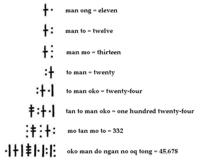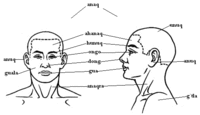Qatama thematic lexicon: Difference between revisions
From FrathWiki
Jump to navigationJump to search
(→Colors) |
m (category cleanup) |
||
| (4 intermediate revisions by one other user not shown) | |||
| Line 1: | Line 1: | ||
{{Qatama}} | {{Qatama}} | ||
[[Category:Qatama | [[Category:Qatama]][[Category:General_lexica]] | ||
=Numbers= | =Numbers= | ||
[[Image: | [[Image:Moj_num_a.gif|frame|right]] | ||
*'''ogo''' = n. number, v. to count | *'''ogo''' = n. number, v. to count | ||
| Line 145: | Line 145: | ||
=Body= | =Body= | ||
[[Image:Anaq.GIF|right|thumb|200px|A diagram with vocabulary]] | |||
[[Image:Udan.GIF|right|thumb|200px|A diagram with vocabulary]] | |||
*'''amaq''' -- body / anatomy | *'''amaq''' -- body / anatomy | ||
| Line 234: | Line 238: | ||
*'''doyoja''' - adj. confusing, difficult to follow or make sense of | *'''doyoja''' - adj. confusing, difficult to follow or make sense of | ||
*'''qung''' - n. phoneme, sound, utterance | *'''qung''' - n. phoneme, sound, utterance | ||
Latest revision as of 04:17, 23 June 2009
This article is one of many about Qatama
.
Numbers
- ogo = n. number, v. to count
- om = zero, nothing , none
- ong = one , single
- to = two
- mo = three
- oko = four
- do = five
- no = six
- oq = seven
- tong = eight
- noq = nine
- man = ten
- tan = hundred
- ngan = thousand
Larger Numbers
- man ong = eleven
- man to = twelve
- man mo = thirteen
- to man = twenty
- to man oko = twenty-four
- tan to man oko = one hundred twenty-four
- mo tan mo to = 332
- oko man do ngan no oq tong = 45,678
Ordinals & Fractions
To form ordinals place the particle nu after the number. To form multiples the suffix -a is added, with seven and nine being irregular, I.e. o'aq seven-times, and no'aq nine-times.
Fractions are form by using the adposition aj meaning of/from.
- ong aj to = half (lit: one of two)
- oko aj do = four fifths
Addintional Vocabulary
- aja = all / every
- toa = twice / double
- daya = many / much / a lot
- dayu = few / a little / a bit
- m`hu = less / fewer / v. to subtract
- m`ha = more / v. to add
- anha = some
Colors

The Qatama color chart.
- aga -- n. color, pigment, hue | v. to color, paint
- oga -- black
- muga -- blue
- myoga -- brown
- huga -- clear, bright
- on -- dark, deep
- anyaga -- fair, blond
- tlaga -- gray
- namuga -- green
- konaga -- orange
- un -- pale in color, light
- koyuga -- pink
- komuga -- purple
- koga -- red
- uga -- white, bright, colorless
- naga -- yellow
Family terminology
- kang -- man, husband
- mung -- woman, wife
- -han -- Mr., sir, gentleman...(used as an unbound morpheme when name is 3 syllables)
- -hana -- Mrs., Miss, Ms., ma'am, lady...(used as an unbound morpheme when name is 3 syllables)
- ata -- n. name | v. to be called
- kong -- person
- tanga -- family (smallest unit in the kinship hierarchy)
- tang -- clan, tribe (ambiguous term that is usually followed by the name of clan/tribe.
- tang ru -- relative (lit: one of the clan/tribe)
- kangha -- father
- mungha -- mother
- taja -- brother
- munu -- sister
- taj -- boy, son
- mungu -- girl, daughter
- mungla -- aunt
- kangla -- uncle
- tajum -- niece, nephew
- kara | kangra -- grandfather
- mura | mungra -- grandmother
- tajal | munul -- cousin
- muhuka -- marriage | to marry | to be married
- muhula -- divorced | to divorce | to be divorced
- ...ajum -- ...in-law
- umun -- baby | child
- umunha -- teenager | adolescent
- kanga -- adult | people
- maja -- friend, ally
- ujuna -- enemy
- ongoq -- elder
- The difference between kangra/kara and mungra/mura is one of familiarity/respect. If you know the elder well enough you would simply refer to him/her with kara/mura, but in times when the goal is to show respect and tact, kangra/mungra are used.
Clothing
- okada -- apron
- alaju -- belt
- noga -- boot, shoe, sandal, sock
- oka -- cloth, rag
- guma -- coat, shirt
- dohuq -- cotton
- kuha'a -- dress, skirt
- myanuq -- earring
- m`dan -- glove, wristband
- hanaka -- hat, headdress
- myar -- jewelry, jewel
- ongaya -- necklace
- tal -- rank, insignia
- yuj -- ring
- gon -- shield, armor
- akama -- shorts, trousers, pants
- onyom -- silk
- kuhaga -- suit
- kuha -- v. to wear clothes | n. clothing
- go`om -- tunic
- okuaha -- underclothes
- gumahu -- undershirt
- kuhan -- uniform
- ulana -- wool
Body
- amaq -- body / anatomy
- anaq -- head / brain
- anuq -- ear(s) / to hear
- ongo -- eye(s) / to see, look
- okota -- heart
- toru -- back, spine
- taruya -- hip / waist
- tara -- belly, stomach
- utar -- chest / breast
- nogra -- feet / toes
- anuja -- leg / calf, thigh
- udan -- hand/arm
- qongo -- joint
- gan -- bone
- gua -- mouth/face
- ogua -- facial hair
- uha -- skin
- udanju -- fingers/knuckles
- dong -- nose / to smell
- g`tla -- shoulder
- qono -- muscle
- anaqra -- neck, throat
- guata -- teeth / to bite
- guaja -- tongue / to taste
- unuq -- hair
Time
- ama -- time
- ung -- past
- naku -- present
- uq -- future
- njam - moment /instant
- maq -- day
- omaq -- sunrise / dawn / morning
- d`maq -- noon / midday break
- umaq -- afternoon / dusk / twilight / sunset
- onaq -- evening
- naq -- night
- unaq -- midnight
- aj maq -- daily
- ngumaq -- yesterday
- kun maq -- today
- kumaq -- tomorrow
- galam -- week
- aj galam -- weekly
- alam -- month
- aj alam -- monthly
- ngaja -- spring
- arung -- summer
- mugun -- fall / autumn
- ngumha -- winter
- alamu -- season
- ngaq -- year
- aj ngaq -- yearly
- ngaq aj umja -- leap-year
- maq aj umja -- leap-day
- kayata -- holiday / festival
- tangaq -- century
- amahaq -- epoch, age
- amaja -- forever, eternity
- maqla -- never / no more
Random Words
These words added in honor of the ZBBers that created them.
- kogyo -- shelf
- qalhangra -- n. a severe storm, particularly referring to noise and winds; (v) to howl and blow, referring to the sound the wind makes
- ogoyo -- n. annoyance, adj. annoying, v. to annoy, etc.
- k`ra -- conj. - but; denoting opposite, contradiction
- ayunha -- n. the horribly uncomfortable feeling that accompanies the inability to complete a sneeze
- q`dogo n. 1. Machinery. 2. A kludge; a hack; an unwieldy solution. 3. figurative A plot device, especially an implausible one. A cock-and-bull story.
- k'gaq - v.intrans to swallow something the wrong way
- d'mu - n. mouse
- ayula - n. star
- qadal - n. quicksand, soft/loose ground
- komoja - adj. the smell of vinegar
- kyutara - v. to ward off, to deter
- n'kara - n a bell, intr. v. to ring or chime (like a bell)
- kyor - n a rattle, shaken noise-maker
- nalha - trans. v to ring or shake (specifically a bell or a rattle)
- ulhu - v. to flow / n. flow
- g'laq - v. to explode
- kujanga - v. to sing a lullaby to make someone fall asleep
- doyoja - adj. confusing, difficult to follow or make sense of
- qung - n. phoneme, sound, utterance






